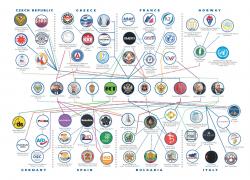How is this Pandemic Affecting Trade in Africa?
Africa was in a critical stage of implementing the African Continental Free Trade Agreement (AfCFTA) before the pandemic struck. Shortly after, Wamkele Mene, the Secretary-General of African Continental Free Trade Area Secretariat, said that the free trade agreement cannot begin as planned on July 1st, because of disruptions caused by COVID-19.
According to him, this will allow African countries to deal with the impact of the coronavirus pandemic. However, the postponement of implementing the trade agreement is a cause for concern for the progress of free trade in Africa given its many awaited benefits.
The AfCFTA is, by the number of participating countries, the largest trade agreement since the formation of the World Trade Organization. When implemented, the trade area will form a $3.4 trillion economic bloc of 1.3 billion people across the continent. Now, unfortunately, COVID-19 is a cog in its wheel.
Beyond its impact on human health, COVID-19 is disrupting an interconnected world economy. Since the pandemic, there has been an abrupt fall in commodity prices, fiscal revenues, foreign exchange receipts, foreign financial flows, travel restrictions, a decline in tourism and hotels, and so on.
As a measure to halt the pandemic, most nations have closed their borders and reduce economic activities; and this will probably lead to a recession. In fact, the World Bank’s Africa’s Pulse report found that COVID-19 is likely to drive Sub-Saharan Africa into its first recession in 25 years, with growth potentially falling as low as negative 5.1% in 2020.
Global prices for food, oil, and non-oil commodities will also affect African countries since most African countries are net importers or exporters of these products. Oil prices lost about 50% of its value dropping from US$67 a barrel to below US$30 a barrel.
If we recall, the late 2014 drop in crude oil prices contributed to a significant decline in GDP growth for sub-Saharan Africa from 5.1 percent in 2014 to 1.4 percent in 2016. During that time, crude oil prices fell by 56 percent over seven months. Already, crude oil prices have fallen by 54 percent in the last three months since the start of the year, with current prices falling below $30 per barrel. Non-oil commodity prices have also declined since January, with natural gas and metal prices dropping by 30 percent and 4 percent, respectively (Brookings Institution, 2020)
According to UNTACD, for the period (2015-2019), the total Africa trade average value was US$760 billion per year which represents 29% of Africa’s GDP. Although intra-African trade is the lowest compared to other regions of the world, at 16.6% of the total. This is because of the low levels of industrial transformation, infrastructural development, monetary integration, and the tariff and non-tariff barriers.
Exports and imports of African countries will drop by at least 35% from the level reached in 2019. As a result, the estimated loss in value is around $270 billion. (Tralac, 2020)
Though the proposed start date for trade under the AfCFTA has been rescheduled given the urgent need for governments to focus efforts on protecting lives from COVID-19, this presents an opportunity for deep thinking on the design of AfCFTA to reflect the realities and risks of the 21st century,
The AfCFTA commits African economies to the removal of trade barriers on imports, which will reduce import costs and consumer prices. It will also help the continent see an increase in foreign direct investments (FDI), create more jobs, and therefore lift millions of people out of poverty.
By Lanre Peter
Lanre Peter is a writer and documentary filmmaker with an interest in Africa's socio-political and economic issues. You can tweet at him @iamLanrePeter This article was first published at Ominira Initiative
http://ominirainitiative.org/how-is-this-pandemic-affecting-trade-in-africa/




















